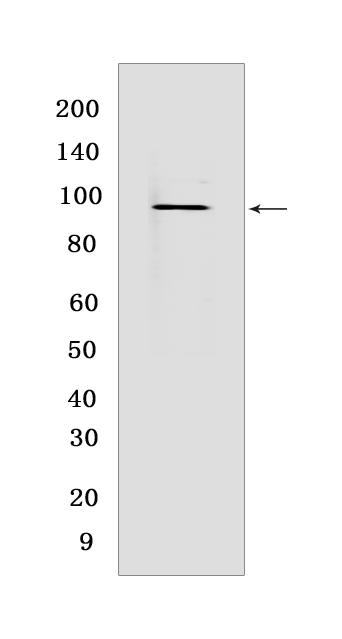GCN5L2 Rabbit mAb [583S]Cat NO.: A13201
Western blot(SDS PAGE) analysis of extracts from HeLa cells.Using GCN5L2 Rabbit mAb [583S] at dilution of 1:1000 incubated at 4℃ over night.
Product information
Protein names :KAT2A,GCN5,GCN5L2,KAT2A_HUMAN,Histone acetyltransferase KAT2A
UniProtID :Q92830
MASS(da) :93,926
MW(kDa) :94 kDa
Form :Liquid
Purification :Protein A purification
Host :Rabbit
Isotype :IgG
sensitivity :Endogenous
Reactivity :Human,Mouse,Rat
- ApplicationDilution
- 免疫印迹(WB)1:1000-2000
- The optimal dilutions should be determined by the end user
Specificity :Antibody is produced by immunizing animals with a synthetic peptide at the sequence of Human GCN5L2
Storage :Antibody store in 10 mM PBS, 0.5mg/ml BSA, 50% glycerol. Shipped at 4°C. Store at-20°C or -80°C. Products are valid for one natural year of receipt.Avoid repeated freeze / thaw cycles.
WB Positive detected :HeLa cells
Function : Protein lysine acyltransferase that can act as a acetyltransferase, glutaryltransferase or succinyltransferase, depending on the context (PubMed:29211711). Acts as a histone lysine succinyltransferase: catalyzes succinylation of histone H3 on 'Lys-79' (H3K79succ), with a maximum frequency around the transcription start sites of genes (PubMed:29211711). Succinylation of histones gives a specific tag for epigenetic transcription activation (PubMed:29211711). Association with the 2-oxoglutarate dehydrogenase complex, which provides succinyl-CoA, is required for histone succinylation (PubMed:29211711). In different complexes, functions either as an acetyltransferase (HAT) or as a succinyltransferase: in the SAGA and ATAC complexes, acts as a histone acetyltransferase (PubMed:17301242, PubMed:19103755, PubMed:29211711). Has significant histone acetyltransferase activity with core histones, but not with nucleosome core particles (PubMed:17301242, PubMed:19103755). Acetylation of histones gives a specific tag for epigenetic transcription activation (PubMed:17301242, PubMed:19103755, PubMed:29211711). Recruited by the XPC complex at promoters, where it specifically mediates acetylation of histone variant H2A.Z.1/H2A.Z, thereby promoting expression of target genes (PubMed:29973595, PubMed:31527837). Involved in long-term memory consolidation and synaptic plasticity: acts by promoting expression of a hippocampal gene expression network linked to neuroactive receptor signaling (By similarity). Acts as a positive regulator of T-cell activation: upon TCR stimulation, recruited to the IL2 promoter following interaction with NFATC2 and catalyzes acetylation of histone H3 at 'Lys-9' (H3K9ac), leading to promote IL2 expression (By similarity). Required for growth and differentiation of craniofacial cartilage and bone by regulating acetylation of histone H3 at 'Lys-9' (H3K9ac) (By similarity). Regulates embryonic stem cell (ESC) pluripotency and differentiation (By similarity). Also acetylates non-histone proteins, such as CEBPB, PPARGC1A, PLK4 and TBX5 (PubMed:17301242, PubMed:16753578, PubMed:27796307, PubMed:29174768). Involved in heart and limb development by mediating acetylation of TBX5, acetylation regulating nucleocytoplasmic shuttling of TBX5 (PubMed:29174768). Acts as a negative regulator of centrosome amplification by mediating acetylation of PLK4 (PubMed:27796307). Acts as a negative regulator of gluconeogenesis by mediating acetylation and subsequent inactivation of PPARGC1A (PubMed:16753578, PubMed:23142079). Also acts as a histone glutaryltransferase: catalyzes glutarylation of histone H4 on 'Lys-91' (H4K91glu), a mark that destabilizes nucleosomes by promoting dissociation of the H2A-H2B dimers from nucleosomes (PubMed:31542297).., (Microbial infection) In case of HIV-1 infection, it is recruited by the viral protein Tat. Regulates Tat's transactivating activity and may help inducing chromatin remodeling of proviral genes..
Tissue specificity :Expressed in all tissues tested..
Subcellular locationi :Nucleus. Chromosome. Cytoplasm, cytoskeleton, microtubule organizing center, centrosome.
IMPORTANT: For western blots, incubate membrane with diluted primary antibody in 1% w/v BSA, 1X TBST at 4°C overnight.


